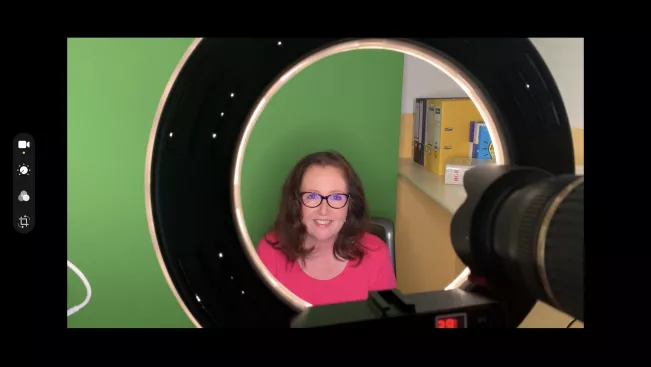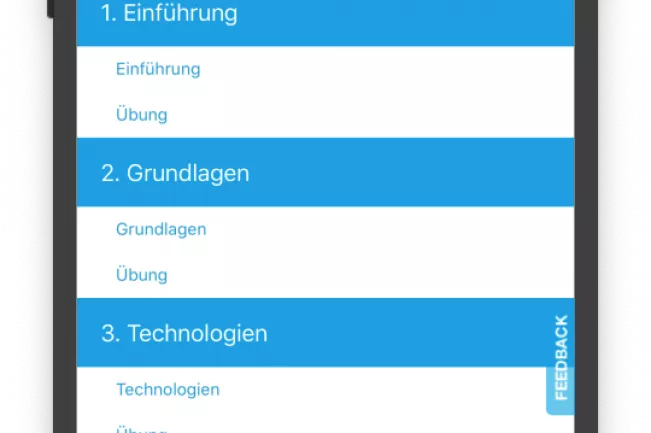Communications and Marketing
Online semester already up and running

The people in charge in the President's Office and the departments recognised very early on that it was doubtful, if not unlikely, that the courses for the 2020 summer semester would be able to kick off with classroom teaching on 20 April. Fortunately, “Lernen und arbeiten online” (“Learning and working online”, or LEA) provides a platform where almost 95 % of courses are already represented. Professors and lecturers pulish notes, video tutorials or other work materials, and sometimes even a complete lecture, in their courses for students to access. In turn, students can upload their completed assignments and other work. Direct discussion between professors and individual students is also possible.
H-BRS is a university that offers classroom teaching and values personal exchange with its students highly. Nevertheless, teaching is to be digitalised where this is beneficial. Digitalisation is a strategic aim for all parts of the university. A significant number of professors have already been using various digital tools to make their teaching more efficient and leave more time for in-depth discussion for a while now. One example is the “flipped classroom” model, where students first have to develop the teaching materials themselves, and only then are they discussed, questions are answered, solutions are reviewed and much more. The widespread interest in the possibilities for teaching led to the establishment of the Centre for Teaching Development and Innovation (ZIEL) in 2018.
A few examples in brief
According to Prof. Dr. Iris Groß, Vice President for Teaching, Learning and Further Education, “the main focus in the current situation is creating well-structured options using simple resources”. She explains that it is important for students to also be able to use the courses later on their own, especially because live data transmission can sometimes fail due to technical issues, and to help students who currently have small children to look after. She herself, as a professor of Engineering Mechanics, among other subjects, explained the basic principles of vibration theory in her course using the strings of her guitar at the kitchen table via her laptop camera and video conferencing software. A dozen students were watching virtually and joined in the discussion. “There was just as much communication as in a classroom lecture,” says Groß. “Via the conferencing app, I shared the contents of my screen with the students and they could note down what I drew and wrote on my PC,” she adds. A video was also made available later on. Groß knows from colleagues that, with large groups, it is better to turn off the microphones and open a chat alongside the video for questions and answers.
Some professors ran their course online for the first time. For example, Prof. Michael Heinzelmann describes his session on selecting materials and lightweight construction as “very improvised”; created overnight as it were. Mathematics and Computer Science professor Irene Rothe was tired and satisfied after her première with 94 students, mainly saying: “I’m impressed with the technology!”

From open source to home-made
The teaching staff discuss the technical possibilities with one another, including screencasts, a Slack workspace for chatting, GitHub Classroom for practical programming sessions, tutorials and all manner of apps and programs for video conferencing. Not all technical aids are equally suited to the peculiarities of course content. Although a live lecture is closest to previous working methods, how do you ensure that all students are being reached? A lot of testing and discussion is still going on around this topic.
Computer science professor Manfred Kaul has relied on audio for a while now. He uses a learning app from the “work&study” project funded by the German Federal Ministry of Education and Research. There are slides for individual sheets, each with a short audio track. For difficult subjects, the slide is sometimes replaced with an explanatory video, a quiz or another app. A chat function is included for questions and there are also exercise sheets or personalised semester projects for group work.
Ingo Groß works with his students on his own server with “open source” software and enables students to complete their practical work in automation technology from home in a live session in digital groups of two. Personalised digital support is on offer if problems arise while working on tasks.
Andrea Schröder and Sandra Rohleder, two law lecturers who normally teach separately in Rheinbach and Sankt Augustin, are counting on a completely different kind of efficiency – they have combined their four sessions on civil law with 250 students to create a joint digital course. The students also have to prepare for this subject and create their own lecture notes based on a videocast from the previous semester. The lecturers communicate directly with students using instant messenger. There will soon be video conferences with smaller working groups to practice legal casework and then present results to the other groups.
As Director of the Centre for Teaching Development and Innovation, Andrea Schröder is a point of contact for many colleagues and has swiftly developed handouts on digital teaching for beginners and the more advanced together with the E-Learning Team.
A big boost for digital teaching
With its expertise, the e-learning team at the University and District Library (HuKB) led by Susanne Kundmüller provides a shoulder to cry on and has developed a clearly structured digital course template for getting started more quickly. The entire lecture material for a semester can be incorporated and distributed across the lecture weeks. Jan Kleinert from the Electrical Engineering, Mechanical Engineering and Technical Journalism department has used the template and is very excited: “The students are meant to develop the material independently as far as possible and we meet in the video conference to clear up questions about the previous week’s material and discuss exercises”.
But the colleagues from the library are doing a lot more – the seven-strong consulting team for e-learning and videoLAB has been running webinars since last week and giving advice on the telephone. Susanne Kundmüller says: “In addition to our demo course, we put on eight webinars per week where over 50 participants sit at their screens each time to learn more about digital teaching. The team also provides advice on the telephone almost 20 times a day on average”.
Susanne Kundmüller and Iris Groß agree that the online semester will give digital teaching a huge boost. “It is a major feat for us all and a steep learning curve. The university is being challenged to expand its technical options very rapidly; converting the established forms into a digital offering involves a considerable amount of extra work for everyone. We are trying hard to ensure that our students do not miss a semester in the short term but we will all benefit from our efforts in the long term too. Many of the things we are currently trying out will continue to enhance our teaching in future”.
Sie haben noch Fragen?

Iris Groß
Dean of the Department of Engineering and Communication, Director of the Centre for Teaching Development and Innovation, Professor of Engineering Mechanics, Design Elements, CAD
Location
Sankt Augustin
Room
B 201
Address
Grantham-Allee 20
53757 Sankt Augustin
Telephone
+49 2241 865 306